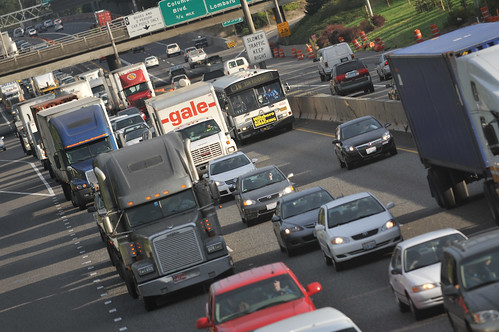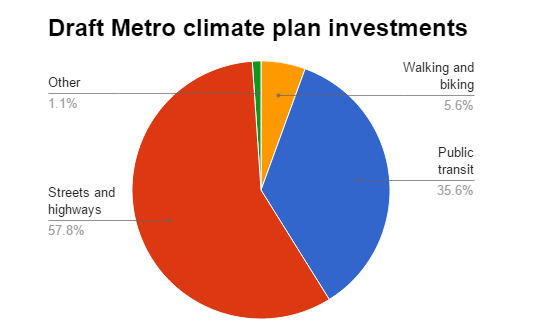
(Photo by J. Maus/BikePortland)
This morning, Clackamas County’s commissioners are considering whether to urge the Portland region to attempt to fight climate change by adding more lanes to its freeways.
“Congestion is a key contributor to greenhouse gas emissions,” the five commissioners write in a draft letter to the regional government Metro, part of their public agenda this week (see p. 26). “It is critical that the language in the Preferred Strategy [of Metro’s Climate Smart Communities plan] reflect a continued commitment to increasing highway capacity, particularly in those areas of critical congestion like the I-205 South Corridor and the Rose Quarter.”
The commissioners of the largely suburban and rural county to Portland’s south and southeast do not mention, in their draft letter, why they think that additional lanes added to local freeways would be unlikely to fill up just as others have.
Advertisement
The letter is a response to Metro’s climate plan. Metro’s draft version of that plan (PDF) calls for the region to dedicate 58 percent of related funding over the next 20 years — about $20 billion — to roads, even though the report says that “adding lane miles to relieve congestion … will not solve congestion on its own.”
Metro’s draft plan calls for $12.4 billion to be spent on transit, which it rates as enough to achieve a 16 to 20 percent cut in per-capita carbon emissions. The plan calls for $2 billion to go to improving biking and walking, which it rates as enough for a 3 to 6 percent reduction.
But most of the money identified as part of Metro’s climate plan is slated to go to road improvement or construction, which the plan identifies as reducing greenhouse gases by less than 1 percent. (The report notes that this figure doesn’t include “synergies” with other policies, however.)
Metro estimates that this set of investments would cut regional carbon emissions per person by 29 percent over the next 20 years.
Some have questioned Metro’s priorities. For example, the Portland Planning and Sustainability Commission recommended more spending on biking and walking relative to public transit (PDF), arguing that “While transit investments are critical, active transportation investments are likely to provide greater rates of return in mobility for the relatively modest funds invested and will also generate significant health co-benefits.”
According to widely cited studies of traffic behavior, increased freeway capacity tends to lead to more and longer driving trips rather than less congestion, because people adjust their habits to drive on a road until it becomes too congested to be useful.
Metro’s climate plan does not mention tolling as a way to reduce freeway congestion. Nor do the Clackamas County commissioners.
Last week, the Bicycle Transportation Alliance urged its supporters to contact Metro and push the organization to invest in transportation modes that emit less greenhouse gas and deprioritize the “road widening and highway construction” that make people emit more greenhouse gas.
— Earlier this month we looked at five smart things Metro’s plan does to fight climate change.


